
 |
Frequently Asked QuestionsWhat is the meaning behind your company's name, "One-Eighty Out?" First, a little geometry refresher: Here is an arrow: Now, a short lesson on fighter-pilot terminology: In a fighter squadron, the term "one-eighty out" is sometimes used to describe something or somebody that is totally out of step compared to the norm, oftentimes in a favorable way. More than once, I was described as being "one-eighty out" from the rest of my squadron-mates. During my career in the Air Force and NASA, I was proud of the fact that I tended to come up with unique solutions to frequently encountered problems. For instance, when fighting for promotions or desirable assignments, my strategy was not to do the things that would make me look good, but to do the things that would make the squadron or unit as a whole a more effective organization. The "good deals" then seemed to take care of themselves. My approach to the problem was "one-eighty out" from the usual, "me first," approach. 
We named our business "One-Eighty Out" because we do things a little differently than most public speakers do, our mode of travel being just one example. We do all of our business travel by motorcycle whenever feasible. When we have business overseas, we go to the airport. But that's about the only time we don't ride a bike to a job. If someone were to offer us a job in, say, Minneapolis in January that paid handsomely, I'd turn it down. I DO like to ride, just not to Minneapolis in January! When I arrive to your event location via motorcycle, I'm revitalized, happy, and ready to give you 110%. Is that any way to run a business profitably? Maybe it is. We are, after all, "One-Eighty Out!" How did you get the nick-name, "Digger" 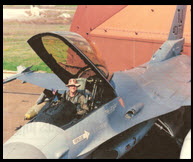
We were sitting around the squadron lounge one Friday afternoon. I was the "new guy" in my F-16 Fighter Squadron at Torrejon Air Base in Spain. One of the lieutenants noted that there used to be a guy in the squadron whose nickname was "Digger," but that he had left a few months earlier. He said we needed a new "Digger" in the squadron and looked at me. I told the young officer that I hated that name. The Squadron Commander, upon hearing this exchange, duly noted my derision and proclaimed that reason enough to officially proclaim me "Digger." The nickname stuck. I know, I know, I really need to come up with a much more exciting story to tell people when they ask me where the name "Digger" came from! What is the meaning behind the "Digger" logo on your business card and on this web site? This logo was designed for us by Bulb Creative (contact provided upon request) in 2005. Inside the "D" you will see an outline of a rider on a fully loaded motorcycle at rest, perhaps enjoying a quiet moment just prior to embarking upon a several thousand mile journey. The stylized "I" is actually the symbol of NASA's Astronaut Office (click here). The motorcycle and rider symbolize our journeys to come; the Astronaut Office emblem symbolizes a journey successfully and safely completed. Were you one of the "smart kids" in school? MOST of the Astronauts I know are brilliant people. I really don't put myself in that category. And no, I wasn't one of the "smart kids" in school. I was often a trouble-maker. However, in my high-school sophomore history class I remember learning about the Spanish conquistador, Hernando Cortes. As the story went, when invading Mexico, he ordered his ships burned so his men would not be tempted to revolt and return to Spain. Cortes had taken away all of their options for their futures! I thought about that story. My grades up to that point had been mediocre. It didn't bother me at the time because I had no intentions of ever going to college. "But," I thought, "what if I change my mind? With these grades, I'd have no options. I'm burning my ships!" So, I labored a little more diligently on my grades from then on, despite working 40 hours a week so I could buy a motorcycle. Several years later, when I finally decided what to do with my life, I was glad I still had the option of going to college, thanks to my improved grades in high-school. To make up for not being "brilliant," I've learned how to: unearth improvements from mistakes, set and attain difficult and significant goals, get the most from everyone on a team, and organize my time effectively, among other things. These are some of the hard-won philosophies and methods I love to share with my audiences. Why did you wait so long before starting college? I was a first-generation college student. Upon high school graduation, however, I had no intentions of ever going to college. I thought college was for rich kids or smart kids and I was neither. What I DID want to do was to see North America from the saddle of a motorcycle. The next two-and-a-half years of my life proved to be a valuable education (click here) - the kind of education money just can't buy at any college or institution. When I finally did start college, it was on my own dime and my own time. I went after my studies with a vengeance. I still maintain that nobody knows the value of a good education better that the person who has tried to succeed without one! Why did you leave NASA when you did? One would have to have a pretty good reason to commit career suicide while at the peak of one's profession. I had a very special and personal reason for doing so: I was keeping a promise. 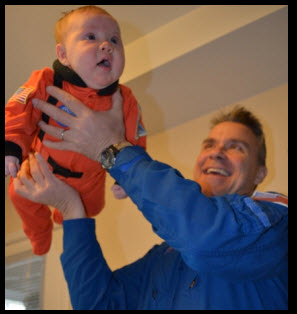
You see, in 1980 I proposed to my future wife and companion, Cheryl, over a fine Green Mill pizza (yum!). During that dinner, we made a few solemn promises to ourselves. We promised to raise two fine children who would both work to make the world a better place, we promised to serve our country during our most productive years, and we promised ourselves that, when our two children were finally off on their own, we would hit the open road again aboard a motorcycle. Long-distance motorcycle travel was something that had already entrenched itself deeply into our souls. The years went by. Cheryl and I raised a fine little family and we devoted the best years of our lives to serving our country. We still rode motorcycles, but not nearly often enough. Before we knew it, our youngest was approaching the end of her high-school years. It was time to make a decision. 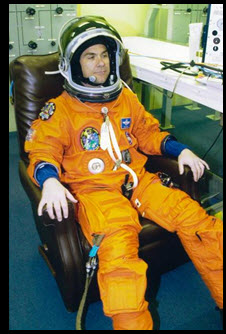
We had a problem, however, a problem we had not considered all those years ago back in that pizza parlor. I had a cool job?, a really cool job. I was a NASA Space Shuttle Pilot! I had flown in Space once and was itching to get up there again. Cheryl was willing to support any decision. A promise is a promise, however, and it was with a heavy heart that I handed a letter of resignation to then Chief of the Astronaut Office, Captain Kent Rominger. We both understood that I wanted to fly in Space one more time in the 22 months that remained before I was to leave the Astronaut Corps. Three weeks later the Space Shuttle Columbia, the one I had piloted less than a year earlier, broke apart upon reentry over East Texas, killing all of her seven crew members as I watched in helplessness and horror from my chair in Houston Mission Control. During the dark weeks and months that followed, I threw myself into the accident investigation. My insignificant little letter of resignation and the seemingly trivial promises Cheryl and I had made together long ago were forgotten. However, when I got a note from Captain Rominger's secretary requesting to schedule a meeting with me, I knew what was on the Boss's mind. We discussed our plans as a family that night over dinner. While I now had no expectations of flying in Space again (there were six crews that had already been assigned when the Columbia accident occurred, and I was not on any of them) , I explained that I felt an obligation to stay at NASA at least until we were flying Space Shuttles again, something that was still going to take quite some time. My son, who was home from college, suddenly shook his head and said, in no uncertain terms, "Dad, you and Mom need to stick to your plans!" Both of our children had been raised hearing stories of Mom's and Dad's motorcycle travels and they knew what our plans meant to us. The next day, Captain Rominger very kindly offered me another Shuttle mission if I were to change my mind and stay past the date mentioned in my resignation letter. I turned him down. It was one of the hardest things I've ever had to do in my life. The Shuttle began flying again about ten months after I left the Astronaut Office. Do you miss being an Astronaut? Who wouldn't? Alan Bean, the fourth person to ever set foot on the Moon, once told me, "While being an Astronaut may not be the best job in the world, it is certainly the best job title in the world!" My main fears when walking away from the "best job title in the world" were that I would be bored and that I would miss flying supersonic jets. 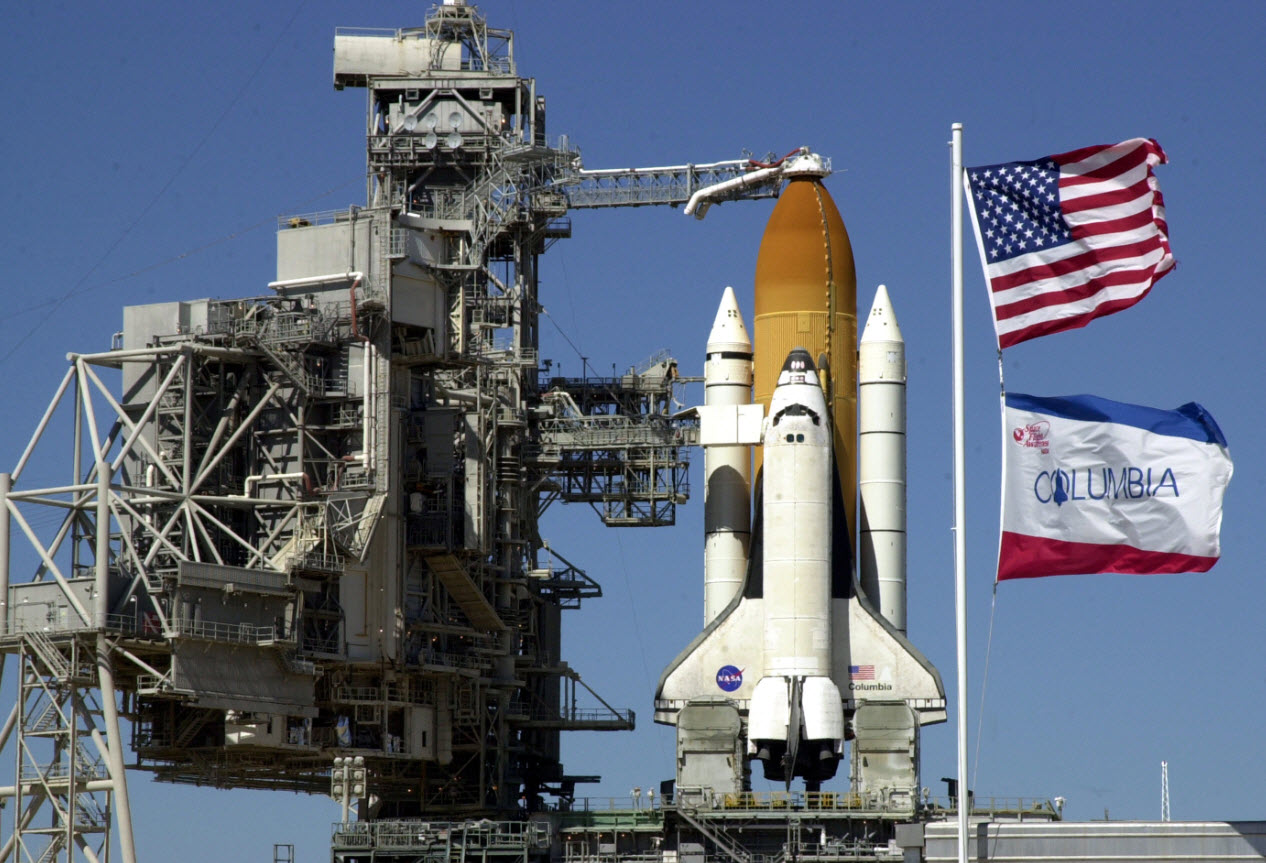
I've gotta say, boredom has not been a problem since leaving NASA! Our little business keeps us hopping. And, I've rediscovered what I already knew, that motorcycle riding is a great substitute for flying jets. I believe that flying jets and riding motorcycles stimulate the same areas of the brain, so, no, I don't really miss any portion of the job, including the flying. What are your passions? Interests? Passions: Education: I home-schooled my two children in mathematics and physics during their K-12 years. I remain deeply involved in educational issues; at last count I had reached over 100,000 people with my positive message, most of them students. 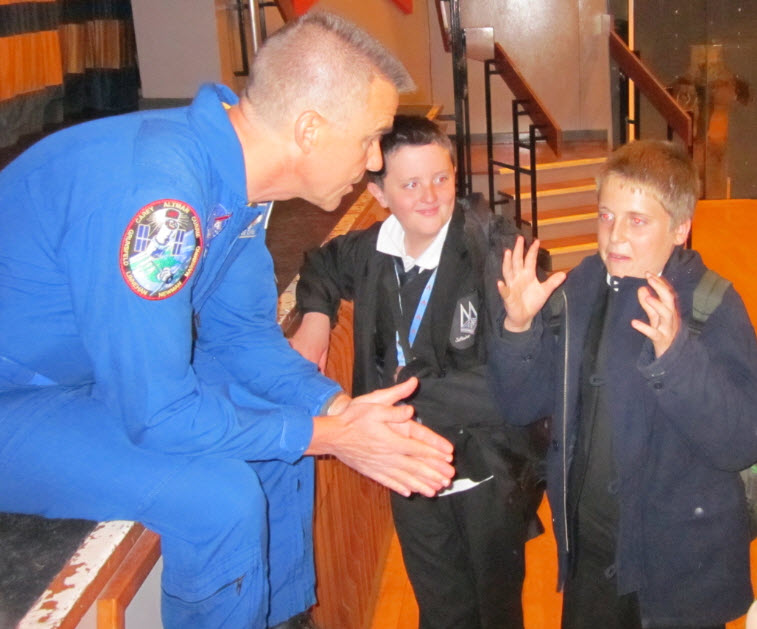
The Future of America: I believe we're headed toward a positive future for America, but much hard work needs to be done to ensure her greatness. One of our primary tasks is to address America's worsening engineer and scientist shortage. Part of my message when addressing schools is that math and science are "really cool" and that achieving literacy in these subjects can lead to great adventures in life. Long Distance Motorcycle Travel: Cheryl and I still do our business travel by motorcycle whenever feasible. We have traveled over 300,000 miles on motorcycles, riding in 52 states and Canadian Provinces, Mexico, and the Republic of Korea. We hope to eventually travel around the world on our motorcycles. Safety and Risk Assessment: Whether it be piloting the Space Shuttle at Mach 26, commanding jet fighter missions deep into enemy airspace, or completing a 7000 mile business trip on motorcycle, I've always tried to do things the safest way I knew how. The extensive formal Accident Investigation and System Safety training I received while serving in the United States Air Force only deepened my passion for Safety. I've made a living performing risk assessment, sometimes "on the fly." My motto concerning this is: "If you're going to do something dangerous, you'd better do it as safely as you can!" Interests: Hiking, camping, motorcycle maintenance, parenting, current events, science, personal finance, computer programming, history, conserving the environment, motocross, baseball, reading science fiction. How long have you been riding motorcycles? I started riding in 1970 at age thirteen, when my step-father brought home a couple of 1970 Honda CT70 trail-bikes. A few years later, I bought a 1973 Can-Am TNT 175. I tried enduro racing on that bike but did not really have the finances to do much racing. Shortly before graduating from high school, I bought a 1975 Suzuki GT750. A few months later I was off to see North America! I did most of my "motorcycle-bumming" on that bike and on a 1977 Yamaha XS750D. While I was in college, we bought a 1981 Honda GL1100 for me and a 1981 Honda GL500 for Cheryl (student loans are a wonderful thing!). Later, after we had our kids, Cheryl bought a 1992 BMW R100RT and I bought a 1990 Yamaha YZ250 that I did quite a bit of motocross racing on. My last race was right before the Columbia Space Shuttle tragedy. After that, I did not have time to properly race motocross anymore. 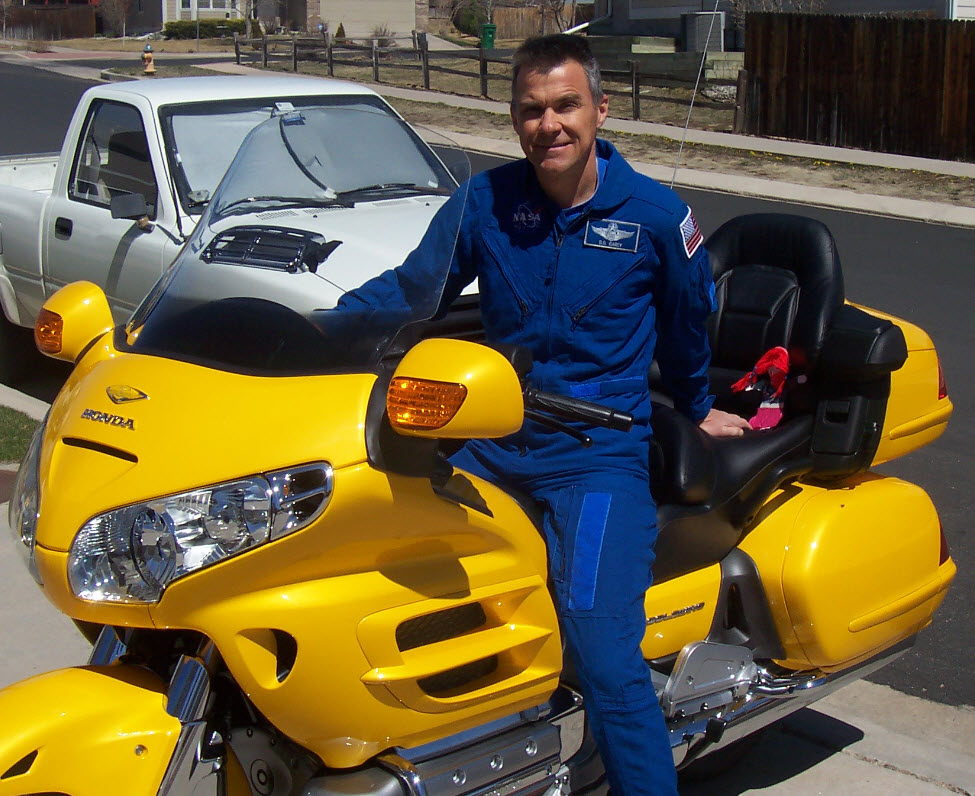
Next, I bought a 2001 Honda ST1100 and Cheryl bought a 2001 Suzuki LS650. We bought a 2005 GL1800 for heavy-duty business travel and Cheryl and I each have 2007 Kawasaki KLR650's that I am currently outfitting for international adventure-travel. There has not been a moment since 1972 that I didn't own at least one motorcycle. Yes, it's a sickness, it truly is! To date, I have ridden over 300,000 miles on motorcycles. One goal is to surpass the million-mile mark someday. Another goal is to ride our motorcycles around the world. I can tell you that the Earth is an incredibly beautiful sight from Low Earth Orbit and we hope to get a bit closer look at her in the future! How do you go to the bathroom in space? This is, without a doubt, the number-one(!) most common question I get asked! Those who don?t ask it probably want to. The "short answer" is, very, VERY, carefully! Like everything else we do in Space, this one takes lots of training before the mission. I'm afraid I need to explain the rest in person, it gets quite technical! 
More Questions?See our FAQ Page or Contact Us Web hosting provided by WebQuestHosting.net Site Design ©2017 WebQuest Hosting. Contact Web Host 
|